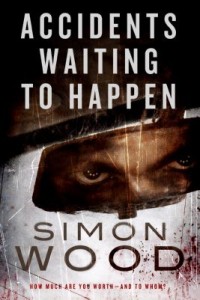A fascination for the odd and the obscure drives my writing. I’m always on the lookout for strange but real occurrences that would make for a really interesting story. When I discovered the unusual business world of viatical settlements, lightning struck and I knew I had a novel.
So what are viatical settlements and what makes them so special? In a sense, they’re a reverse insurance arrangement. If you own a life insurance policy and you want to cash it in, you go to a viatical settlement agent who will find someone to buy it. The buyer will give you pennies on the dollar for your policy and take over the monthly dues on your life insurance. In return, they will become the beneficiary when you die. The closer you are to the grave, the bigger the payout.
I came across viatical settlements on a TV news magazine show. The feature was well done. The story covered all the parties involved in one of these arrangements. They interviewed a person with HIV who had sold their life insurance as well as a retired couple who had purchased several policies through a middleman who arranged the sales. It was great to see a person who’d had one foot over the threshold of death’s door come back from the brink after selling his policy. It was shocking watching the retired couple that had sunk their retirement fund into viatical settlements. They displayed vehement disgust for the people they’d paid good money to who hadn’t had the good graces to die as predicted.
The news clip ended with a kicker and it was that kicker that really grabbed my attention. The middleman is supposed to keep the identities of the buyer and seller confidential. The man with HIV who’d sold his life insurance produced a birthday card. It had arrived unsigned on his last birthday. The message was simple and to the point. It said: Why aren’t you dead yet?
I couldn’t let this go. There was a book here. Viatical settlements presented a very interesting concept. Criminals aren’t the only ones with a price on their heads. Everyone is worth more dead than alive, thanks to their life insurance. And what if the beneficiaries can’t afford to wait to inherit? A murder would lead someone to the beneficiary, but an accidental death wouldn’t.
For Accidents Waiting to Happen, I stretched the rules concerning viatical settlements a bit to create a cat and mouse thriller. I made rules surrounding viaticals much more far ranging. Essentially, anyone could qualify. In the book, Josh Michaels takes a bribe to pay for his newborn child’s medical expenses. His secretary blackmails him when she learns of the bribe. To pay her off, Josh sells his life insurance policy. Years later, when the bribe, the blackmail and the policy sale are long forgotten, he’s driving home when he’s forced off the road by another vehicle into a river. Instead of helping Josh, the driver gives him the thumbs-down gesture and drives off. Josh survives the accident and learns he’s not the only having accidents. The one thing these people have in common is that they’ve all made a viatical settlement in their past.
Usually, truth is stranger than fiction, and I love that, but if I can get a hold of it, I’ll make that fiction a little stranger.



I love it. You have the perfect twisted mind for writing thrillers.
Thanks Linda. You’re very kind for saying. :-/
Bloomin’ ‘eck mate, as Linda said, “You have the perfect twisted mind for writing thrillers.” But then I had a small taste of that when I read Paying the Piper 🙂 Definitely getting this one. I’d never heard of viatical settlements before, so your background information was a bit of an eye opener.
I’m attracted to the weird. 🙂